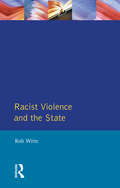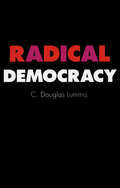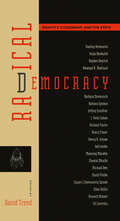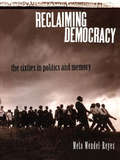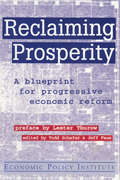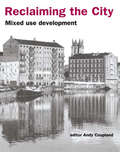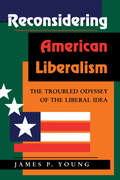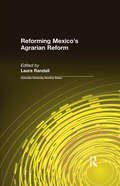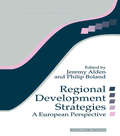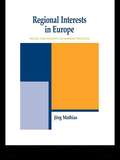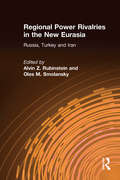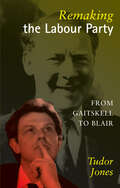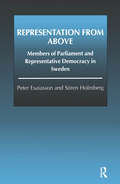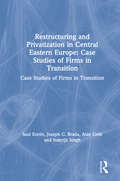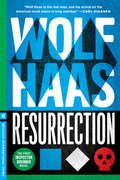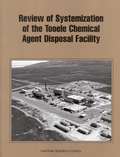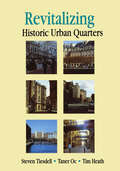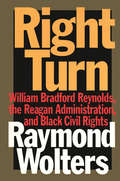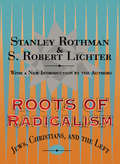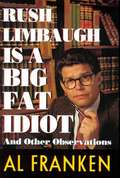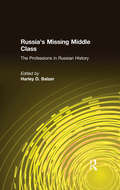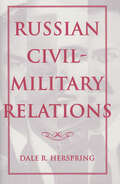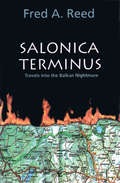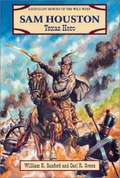- Table View
- List View
Racist Violence and the State: A comparative Analysis of Britain, France and the Netherlands
by Rob WitteRacist Violence and the State is the first serious study to apply a comparative research-based approach to the study of racist violence in Britain, France and The Netherlands since 1945. Setting racist violence within a historical background of the post-imperialist legacy, the author presents an accessible, fascinating and highly original analysis of the development of public and state attitudes to racist violence over the past 50 years.
Radical Democracy
by Douglas C. LummisC. Douglas Lummis writes as if he were talking with intelligent friends rather than articulating political theory. He reminds us that democracy literally means a political state in which the people (demos) have the power (kratia). The people referred to are not people of a certain class or gender or color. They are, in fact, the poorest and largest body of citizens. Democracy is and always has been the most radical proposal, and constitutes a critique of every sort of centralized power. Lummis distinguishes true democracy from the inequitable incarnations referred to in contemporary liberal usage. He weaves commentary on classic texts with personal anecdotes and reflections on current events. Writing from Japan and drawing on his own experience in the Philippines at the height of People's Power, Lummis brings a cross-cultural perspective to issues such as economic development and popular mobilization. He warns against the fallacy of associating free markets or the current world economic order with democracy and argues for transborder democratic action.Rejecting the ways in which technology imposes its own needs, Lummis asks what work would look like in a truly democratic society. He urges us to remember that democracy should mean a fundamental stance toward the world and toward one’s fellow human beings. So understood, it offers an effective cure for what he terms "the social disease called political cynicism." Feisty and provocative, Radical Democracy is sure to inspire debate.
Radical Democracy: Identity, Citizenship and the State
by David TrendRadical Democracy addresses the loss of faith in conventional party politics and argues for new ways of thinking about diversity, liberty and civic responsibility. The cultural and social theorists in Radical Democracy broaden the discussion beyond the conventional and conservative rhetoric by investigating the applicability of radical democracy in the United States. Issues debated include whether democracy is primarily a form of decision making or an instrument of popular empowerment; and whether democracy constitutes an abstract ideal or an achievable goal.
Reclaiming Democracy: The Sixties in Politics and Memory
by Meta Mendel-ReyesMeta Mendel-Reyes provides a critical look at our fascination with the sixties, discusses the ways in which democratic participation was at the heart of sixties politics, and explores the interrelationship between the history and memory of the sixties and contemporary democratic politics. Mendel-Reyes stresses that if told properly, the story of the sixties could help open our eyes to the possibility that ordinary people can take democratic action and do have the ability to make a difference in nineties politics. In a time of cynicism about the American government's ability to solve the crises of inequality, poverty and racism, Mendel-Reyes puts the decline of political participation in historical context and provides hope for the coming decades.
Reclaiming Prosperity: Blueprint for Progressive Economic Policy (Economic Policy Institute Ser.)
by Todd Schafer Jeff FauxThis work presents a predicted summary of major economic challenges facing the United States in the last years of the 20th century. Intended to shape the platforms of the major parties and the general public, it contains proposals by leading specialists aimed at resolving such challenges.
Reclaiming the City: Mixed use development
by Andy CouplandMixed use development is about retaining or creating a mix of different uses in cities or neighbourhoods. The trend in UK development has been towards specialisation and areas with single uses. Increasing the mix of uses is thought to reduce the need to travel, lower the likelihood of crime, improve the ambience and attractiveness of areas and contribute to the sustainability of cities.
Reconsidering American Liberalism: The Troubled Odyssey Of The Liberal Idea
by James YoungForty years ago Louis Hartz surveyed American political thought in his classic The Liberal Tradition in America. He concluded that American politics was based on a broad liberal consensus made possible by a unique American historical experience, a thesis that seemed to minimize the role of political conflict.Today, with conflict on the rise and with much of liberalism in disarray, James P. Young revisits these questions to reevaluate Hartz's interpretation of American politics. Young's treatment of key movements in our history, especially Puritanism and republicanism's early contribution to the Revolution and the Constitution, demonstrates in the spirit of Dewey and others that the liberal tradition is richer and more complex than Hartz and most contemporary theorists have allowed.The breadth of Young's account is unrivaled. Reconsidering American Liberalism gives voice not just to Locke, Jefferson, Hamilton, Madison, Lincoln, and Dewey but also to Rawls, Shklar, Kateb, Wolin, and Walzer. In addition to broad discussions of all the major figures in over 300 years of political thought?with Lincoln looming particularly large?Young touches upon modern feminism and conservatism, multiculturalism, postmodernism, rights-based liberalism, and social democracy. Out of these contemporary materials Young synthesizes a new position, a smarter and tougher liberalism not just forged from historical materials but reshaped in the rough and tumble of contemporary thought and politics.This exceptionally timely study is both a powerful survey of the whole of U.S. political thought and a trenchant critique of contemporary political debates. At a time of acrimony and confusion in our national politics, Young enables us to see that salvaging a viable future depends upon our understanding how we have reached this point.Never without his own opinions, Young is scrupulously fair to the widest range of thinkers and marvelously clear in getting to the heart of their ideas. Although his book is a substantial contribution to political theory and the history of ideas, it is always accessible and lively enough for the informed general reader. It is essential reading for anyone who cares about the future of U.S. political thought or, indeed, about the future of the country itself.
Reforming Mexico's Agrarian Reform (Columbia's University Seminars Ser.)
by Laura RandallThis work provides a survey and analysis of Mexico's agrarian reform, covering topics such as the agricultural provisions of NAFTA. The book also discusses the events in Chiapas that are crucial to Mexico's current political situation and the implications of reform for US-Mexican trade.
Regional Development Strategies: A European Perspective (Regions and Cities #Vol. 15)
by Jeremy Alden Philip BolandRegional development strategies have become the focus of attention in many countries in the 1990s. This textbook provides a conceptual, theoretical and empirical analysis of regional development strategies within a European context It examines the various regional development strategies which are currently being pursued within the regions of Europe - defined in its loosest term to include East and West. The book describes how many different European regions are attempting to reduce regional disparities by engaging themselves in coherent and focused regional development strategies, and there is also private sector approach to regional economic development. There are many case studies from Europe and from other parts of the world, including Japan, thereby providing lessons that different countries and regions can learn form each other.
Regional Interests and Regional Actors: Wales and Saxony as Modern Regions in Europe (Routledge Studies in Federalism and Decentralization)
by Jörg MathiasThe question of how to organize and manage sustainable regional development has recently come to the fore in many places across the industrialized countries of Central and Western Europe, and especially within the European Union (EU).This book looks at the home-grown natural, economic and social, socio-political, political and administrative conditions which policy makers face, while also being subjected to numerous external influences. Political actors in less important EU regions attempt to create and implement strategies of regional development in the context of regional policy-making by EU institutions, national governments and the globalization process.
Regional Power Rivalries in the New Eurasia: Russia, Turkey and Iran
by Alvin Z. Rubinstein Oles M. SmolanskyThis text discusses the relationship between Russia, Iran and Turkey since the collapse of the Soviet empire. These nations are the main rivals for influence in the Caucasas and Central Asia, with China a distant factor.
Remaking the Labour Party: From Gaitskell to Blair
by Tudor JonesRemaking the Labour Party examines the development of revisionist thought in the Labour Party from the 1950s up to Tony Blair's successful attempt to rewrite Clause Four in April 1995. The main focus is upon the most distinctive and controversial aspect of Labour revisionism - its attitude toward public ownership and socialism, private ownership and the mixed economy.Remaking the Labour Party comprises a detailed study of a process of ideological conflict which began with the Labour Party's debate in the 1950s over the link between public ownership and socialism. The deepening confrontation that arose from the revisionist thinking of Crosland and Gaitskell is explored in the Clause Four controversy of 1959-60 and in the uneasy compromise forged in its aftermath. The period of ideological truce under Harold Wilson's leadership is examined, together with the bitter conflict that later resurfaced in the party during the 1970s and early 80s. Finally, the study focuses on the second stage of Labour's policy and ideological rethinking which developed after 1983 under the leadership first of Neil Kinnock and then of Tony Blair.Drwing on the author's own interviews with some of the leading protagonists of the debate, as well as upon a wide range of primary and secondary sources, Remaking the Labour Party will be of value to students of modern British politics and political thought, it will also be of interest to observers and members of the Labour Party.
Representation From Above: Members of Parliament and Representative Democracy in Sweden
by Peter Esaiasson Sören HolmbergThis book uses Sweden as a test case to analyze how parliament and elected representatives function in a representative democracy. Despite the status of Scandinavian countries as perhaps the world’s most egalitarian societies, the book argues that the best summary characterization of Swedish representative democracy is an elitist system run from above. The book also argues that an individualist representational model is relevant to the Swedish setting and most likely, to other settings as well. Representative democracy is not just party-based democracy - not even in a country with strong and disciplined parties. The book takes a broad approach to the study of political representation. It integrates into a single analytical framework concepts and theories from neighbouring traditions such as legislative behaviour, opinion formation and interest organizations. The study is based on a comprehensive set of data, including three surveys of the Members of the Swedish Parliament, corresponding voter surveys and content analysis of mass media and parliamentary records.
Restructuring and Privatization in Central Eastern Europe: Case Studies of Firms in Transition
by Alan Gelb Inderjit Singh Joseph C. Brada Saul EstrinThis volume presents cases from a World Bank study of state-owned industrial firms in Poland, Hungary and the Czech and Slovak republics. Topics that are covered include: structure of the industry; history of the firm; and product mix and sales pattern.
Resurrection
by Annie Janusch Wolf HaasWhen the corpses of an American couple are found frozen to death on a ski lift in a pristine Alpine village, Brenner is called in to investigate, in his first case as a P.I.When Inspector Simon Brenner leaves the police force, he's looking forward to some peace and quiet, and the lovely Alpine village of Zell seems like just the place. That is, until the corpses of an American couple are found frozen on a ski lift, and Brenner, doing some part time work for an insurance company, is called in to investigate the matter. It turns out that the victims have relatives in the area, and the crime--if it is a crime--seems like it could be a family affair. Except the prime suspect has a solid alibi and no one in picture-perfect Zell is talking.So Brenner, in his inimitable style, draws out all the village's characters--the longtime residents, the resort staff and guests--and uncovers the dirty doings that lurk underneath the pristine snow...and family secrets long buried. This first book sets up the totally unique, quirky narrative voice that runs throughout the series and introduces the reluctant, yet brilliant, Detective Brenner,in a plot with as many twists and turns as a Double Black Diamond.
Review and Evaluation of Alternative Chemical Disposal Technologies
by National Research CouncilIn 1994 the National Research Council published Recommendations for the Disposal of Chemical Agents and Munitions, which assessed the status of various alternative destruction technologies in comparison to the Army's baseline incineration system. The volume's main finding was that no alternative technology was preferable to incineration but that work should continue on the neutralization technologies under Army consideration.In light of the fact that alternative technologies have evolved since the 1994 study, this new volume evaluates five Army-chosen alternatives to the baseline incineration system for the disposal of the bulk nerve and mustard agent stored in ton containers at Army sites located in Newport, Indiana, and Aberdeen, Maryland, respectively. The committee assessed each technology by conducting site visits to the locations of the technology proponent companies and by meeting with state regulators and citizens of the affected areas. This volume makes recommendations to the Army on which, if any, of the five technologies has reached a level of maturity appropriate for consideration for pilot-scale testing at the two affected sites.
Review of Systemization of the Tooele Chemical Agent Disposal Facility
by Committee on Review Evaluation of the Army Chemical Stockpile Disposal ProgramIn 1993, at Tooele Army Depot, Utah, the Army completed construction of the Tooele Chemical Agent Disposal Facility (TOCDF), the first complete facility for destruction of lethal unitary chemical agents and munitions to be built in the continental United States. The TOCDF will employ the Army's baseline incineration system to destroy the depot's increment of the nation's aging unitary chemical stockpile. This book assesses Army changes and improvements to the TOCDF in response to recommendations contained in earlier reports of the committee. It assesses aspects of the facility's readiness for safe agent handling and destruction operations, its agent monitoring system, and its site specific risk assessment.
Revitalising Historic Urban Quarters
by Steve Tiesdell Tim Heath Taner OcThis book synthesizes urban design and urban regeneration by examining the revitalization of a number of historic urban quarters. Its focus is on quarters or areas where there is a significant number of historic buildings concentrated in a small area; with places and area-based approaches. Many cities have such quarters that confer on them a sense of place and identity through their historic continuity and cultural associations. The quarters are often an integral element of the city's image and identity. The lessons and observations from the experience of the revitalization of such historic urban quarters forms the core ofthis book with a number of case study examples from North America and Europe showing a variety of approaches to and outcomes of revitalization.
Right Turn: William Bradford Reynolds, the Reagan Administration, and Black Civil Rights
by Raymond WoltersIn the spirit of the time, the Civil Rights Act of 1964 and the Voting Rights Act of 1965 called for nondiscrimination for American citizens, seeking equality without regard for race, color, or creed. After the mid-1960s, to make amends for wrongs of the past, some people called for benign discrimination to give blacks a special boost. In business and government this could be accomplished through racial preferences or quotas; in public education, by considering race when assigning students to schools. By 1980 this course reached a crossroads.Raymond Wolters maintains that Ronald Reagan and William Bradford Reynolds made the "right turn" when they questioned and limited the use of racial considerations in drawing electoral boundaries. He also documents the Reagan administration's considerable success in reinforcing within the country, and reviving within the judiciary, the conviction that every person black or white should be considered an individual with unique talents and inalienable rights.This book begins with a biographical chapter on William Bradford Reynolds, the Assistant Attorney General who was the principal architect of Reagan's civil rights policies. It then analyzes three main civil rights issues: voting rights, affirmative action, and school desegregation. Wolters describes specific cases: at-large elections and minority vote dilutions; congressional districting in New Orleans; legislative districting in North Carolina; the debates over the Civil Rights Act of 1964; social science critiques of affirmative action; the question of quotas; and school desegregation and forced busing.Because Ronald Reagan and William Bradford Reynolds were men of the right, and because most journalists and historians are on the left, Wolters feels the "people of words" have dealt harshly with the Reagan administration. In writing this book, he hopes to correct the record on a subject that has been badly represented. Wolters points out that, beginning in the 1980s and continuing in the 1990s, the Supreme Court endorsed the legal arguments that Reagan's lawyers developed in the fields of voting rights, affirmative action, and school desegregation. In Right Turn, Wolters responds to those who claimed that Reagan and Reynolds were racists who wanted to turn back the clock on civil rights, and he describes civil rights cases and controversies in a way that is comprehensible to general readers as well as to lawyers and historians.
Roots of Radicalism: Jews, Christians, And The New Left
by Stanley RothmanWhen Roots of Radicalism first appeared. Nathan Glazer noted "this is a major work on the relationship between radical politics and psychological development." He went on to predict "no one will be able to write about the left and radicalism without taking it into account." Now finally available in a paperback edition, with a new introduction, the reader can evaluate just how prescient the authors are in their review of the student radical movement. Replete with interviews of radical activists, their provocative book paints a disturbing picture.The book raises critical questions about much previous social science research and ultimately about the reason an entire generation of Americans was so infatuated with the radical mystique. Robert A. Nisbet called the book "an extraordinarily skilled fusion of historical and psychological approaches to one of the most explosive decades in American social history." Robert E. Lane added "it will be prudent to read Rothman and Lichter along with our well worn copies of Keniston and Fromm." Writing in Political Psychology, Dan E. Thomas argued "the [book] is arguably the most important and definitely the most provocative book in the field of personality and politics to have appeared in the past several years." Recently, in Forbes. Peter Brimelow referred to Roots of Radicalism as "Rothman's main achievement as a political scientist...his definitive study of the 1960s New Left."In the new introduction, the authors review the initial reception of Roots of Radicalism and its subsequent treatment. They also review the major literature on the causes, course, and consequences of the student movement of the 1960s which has appeared since the publication of the book. Finally, they update their own analysis.
Rush Limbaugh is a Big Fat Idiot and Other Observations
by Al FrankenA snarky, sometimes vitriollic examination of the title proposition, as well as a number of other political scandals and issues of the past two decades.
Russia's Missing Middle Class: The Professions in Russian History
by Harley D. BalzerThis work describes the emergence of the professions in late tsarist Russia and their struggle for autonomy from the aristocratic state. It also examines the ways in which the Russian professions both resembled and differed from their Western counterparts.
Russian Civil-Military Relations
by Dale R. HerspringFrom the author of Rumsfeld’s Wars, “an important addition to the bookshelf of any analyst of post-Soviet security affairs” (Slavic Review).Dale Herspring analyzes three key periods of change in civil-military relations in the Soviet Union and postcommunist Russia: the Bolshevik construction of the communist Red Army in the 1920s; the era of perestroika, when Mikhail Gorbachev attempted to implement a more benign military doctrine and force posture; and the Yeltsin era, when a new civilian and military leadership set out to restructure civil-military relations. The book concludes with a timely discussion of the relationship of the military to the current political struggle in Russia.“The history is both fascinating and timely.” —European Security“When military reform returns to its deservedly prominent place in the Russian political agenda, Herspring’s book will offer invaluable guidance.” —Mark von Hagen, American military historian
Salonica Terminus
by Fred A. ReedA vivid, contemporary travelogue, Salonica Terminus explores a current landscape thronged with figures bent beneath the weight of history. It peers beneath the rotting logs of ideology, and prods the decomposing hulks of historical corpses that litter this region of dark mountains and misty valleys. Through its pages lurch extremists, confidence men and would-be national saviors in the vivid, disarticulated manner of shadow puppets. Injustice and blood, it suggests, breed revenge and further injustice in a land where memories are long and knives are sharp. From Bosnian actuality to Macedonian potentiality, Fred A. Reed's recent travels in this region lead him to encounter a landscape inscribed with a shocking testimony: ethno-racialist aspirations remain the only coin in which peoples feel they can express their belonging, their social solidarity--the only credible alternative to the blight of free market globalism.
Sam Houston: Texas Hero (Legendary Heroes of the Wild West)
by Carl R. Green William R. Sanford- Brings the action of the frontier days to life for the reluctant reader. - Recounts the adventures of the explorers, pioneers, and settlers of the West.
